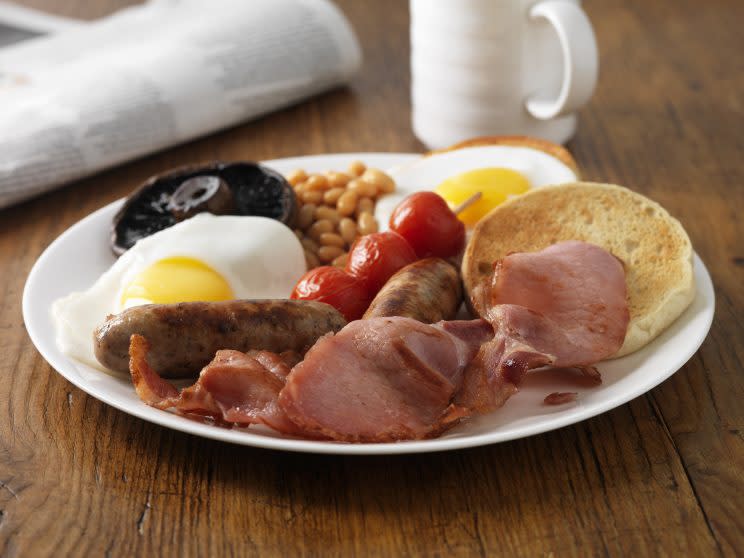Brexit means pricier breakfast: Hard leave could see cost of fry-up soar

Tongue-tied politicians have regularly misspoken “Brexit means breakfast”, but new research suggests leaving the EU could mean the opposite, with the cost of the average fry-up expected to cost at least £3 more in two years time.
Key ingredients such as sausages, bacon, tomatoes, baked beans and even humble brown sauce will be slapped with higher import tariffs.
MORE: A butter and cream shortage is expected by Christmas, warns Arla boss
MORE: The Yorkshire cafe serving up 600 full English breakfasts a week for just £1 each
If the UK were to leave the European Union without a deal, and default to WTO rules, a typical basket of ingredients for a family breakfast could rise by almost 13% from £23.59 to £26.61, say accountants KPMG.

Pure orange juice (from Spain but bottled in Ireland) and olive oil (from Italy and Spain) were among the items set to incur the biggest increase, at 34% and 30%, respectively.
Other examples highlighted by the firm include a 500g pack of French butter rising by a quarter to £4.08 and a 300g pack of Danish bacon up by 18p to £2.18.
MORE: Government ‘struggling’ to balance Brexit trade negotiations
Butter prices are already sky high, up 20% over the past 12 months. KPMG’s research comes after warning from dairy giant Arla, that butter and cream could be in short supply come Christmas.
Bob Jones, director at KPMG UK, said WTO tariffs could have a significant impact on both consumers and retailers alike.
MORE: US could start trade war with Europe, German minister warns
“It’s important to remember that our analysis does not even reflect the steep costs consumers and retailers are already facing as a result of the pound sterling’s devaluation or the costs of any new non-tariff barriers,” he said.
“If the UK leaves the EU without a trade deal or transitional agreement, we can expect both higher prices and a huge spike in red tape at the borders.”

KPMG UK analysed the cost of mid-range ingredients of a fry-up from a leading UK supermarket, and applied the current EU external customs tariffs to each, whilst also taking into account the grocer’s mark-up.
Milk, free range eggs and sliced white bread were all sourced from the UK in the analysis, however the other items were intentionally imported for demonstrative purposes.
MORE: May ‘doesn’t understand’ Brexit negotiations
“The British consumer has become accustomed to seasonal produce all year round and has binged on a diet of discounts for some time,” added Paul Martin, UK head of retail at KPMG.
“With that in mind, our analysis, which focused mainly on imported goods, isn’t too unrealistic.
“Shoppers could be forgiven for overlooking the significant impact customs will have on the prices they pay at the till. However, against a backdrop of increasingly squeezed margins, it is unlikely retailers will be able to hold the flood on higher costs indefinitely.”
The research comes as Justin King, the former boss of Sainsbury’s, told BBC Panorama that UK shoppers are “completely in the dark” over the potential impact of Brexit on their food bills.
He tells the investigative programme that it was “very clear” consumers would face “higher prices, less choice and poorer quality”.
He says: “Brexit, almost in whatever version it is, will introduce barriers. That makes it less efficient which means all three of those benefits – prices, quality and choice – go backwards.”

 Yahoo Finance
Yahoo Finance 
